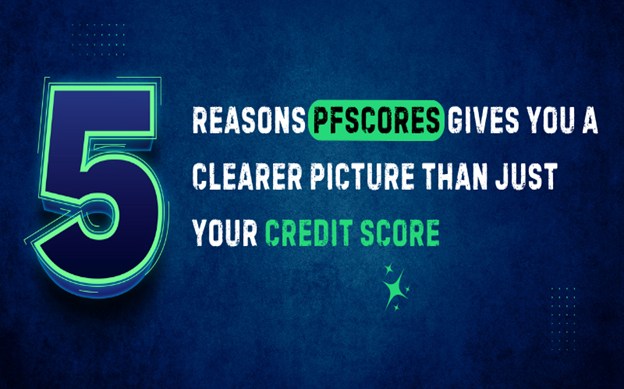5 Reasons PFScores Gives You a Clearer Picture Than Just Your Credit Score
Meta Title: 5 Reasons PFScores Shows More Than Credit Score
Meta Description: See beyond your credit score. PFScores analyzes savings, insurance, and spending to show your true financial picture—accurate and easy to use.
Most people think a credit score tells the full story of their financial health. It doesn’t.
Although it’s a crucial component, your credit score is only one part of the whole. PFScores (Personal Financial Scores) goes several steps further by examining your broader financial habits, risks, and goals. It’s a free tool that takes about 10–15 minutes to complete, yet it paints a much deeper picture of your financial well-being than a credit report ever could.
Here are five reasons why.
1. PFScores Evaluates Your Savings Behavior
Your credit score doesn’t care how much you’ve saved—whether for emergencies, retirement, or large future purchases. It only looks at your borrowing behavior.
PFScores, on the other hand, places savings at the core. It asks whether you have an emergency fund, how consistent your saving habits are, and whether you’re building a buffer for financial stability. This matters because savings directly impact your ability to absorb life’s unexpected costs—something a credit score can’t predict.
2. It Assesses Risk Management, Not Just Debt Repayment
Credit scores measure how well you pay off debt. But what happens if you lose your income or face a health emergency?
PFScores evaluates whether you’re protected against financial risks through insurance, income protection, and contingency planning. It recognizes that financial stability isn’t just about making payments on time—it’s also about preparing for what could go wrong.
This risk-aware approach gives you insight into areas of vulnerability that your credit score ignores completely.
3. PFScores Offers a 360° Financial Assessment
Credit reports look backward—at loans, credit cards, and payment history. PFScores takes a full-circle view by examining:
- Assets
- Liabilities
- Income
- Debt levels
- Insurance
- Savings behavior
This broader assessment means you get a realistic picture of your financial position today, not just how lenders see you.
4. It Benchmarks You Against Real People, Not Just Credit Models
With PFScores, your results aren’t based on vague formulas used by banks. Instead, you get to see how your score compares to other users—real individuals who’ve taken the same assessment.
This benchmarking gives you context. Do you have an advantage over others when it comes to saving money? Is your debt-to-income ratio average, or too high? Seeing your place on the spectrum helps you understand what “healthy” really looks like, rather than relying on a credit score’s narrow view.
5. It’s Built for Personal Use—Not Just Lenders
Credit scores were designed to help lenders decide whether to give you a loan. They weren’t designed to assist you with money management.
PFScores flips that. It’s made for individuals and families who want to understand their finances better, without needing a financial advisor or complex software.
It’s private, easy to use, and doesn’t require linking your accounts or giving away sensitive details. You get a personalized report that shows exactly what’s working—and what’s not.
Conclusion:
Your credit score is a helpful tool, but it’s not the complete picture. PFScores goes above and beyond by giving you a comprehensive, understandable, and practical view of your financial status. If you’re serious about making smarter money decisions, understanding your full financial picture matters. It allows you to observe and do more with PFScores.
Take 10 minutes to see where you stand. Try PFScores.com for free and get a real sense of your financial health—beyond just your credit score.

